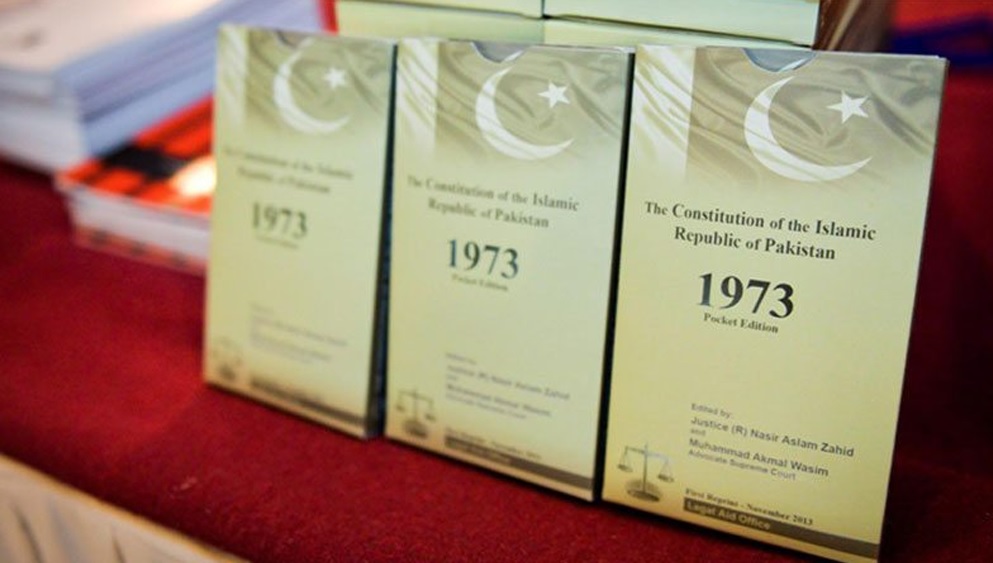Law Minister Fawad Chaudhry read out Article 5 of the Constitution when the National Assembly session started on Sunday to vote on no-confidence motion against Prime Minister Imran Khan and accused the opposition of disloyalty to the state.
Deputy Speaker Qasim Suri then quickly disallowed voting on the no-trust motion and adjourned the session indefinitely. Later, President Arif Alvi dissolved the assembly on the advice of Prime Minister Imran.
Let’s see what the Article 5 of the 1973 Constitution states:
ARTICLE 5:
Loyalty to State and obedience to Constitution and law.
(1) Loyalty to the State is the basic duty of every citizen.
(2) Obedience to the Constitution and law is the 10 [inviolable] obligation of every citizen wherever he may be and of every other person for the time being within Pakistan.
Is it legal to invoke the article to dissolve the assembly?
Lew expert Saroop Ijaz told a channel Geo that prima facie it seems that this move is in violation of the constitution and also of democratic norms.
“When a [not trust] motion has been tabled and when the attorney general has told the court that voting will go through, then this [move] seems to be a disregard of constitutional provisions,” he said.
Ijaz said that at the moment the only arbitrator is the Supreme Court.
“The courts can intervene if an action within the house is with mala fide intent and without jurisdiction,” he added.
“If the court decides that this is indeed mala fide, then in that case the prime minister’s advice to dissolve the National Assembly will be declare null and void because the entire premise is that he is a prime minister against whom there is a vote of no confidence,” he continued.
The lawyer said if the court decides against the speaker’s move, then the resolution of no confidence will be taken up again for voting.
“In my opinion, the courts can intervene and have said it multiple times themselves as well,” Ijaz said.
“While courts are reluctant to intervene in internal proceedings of the house, this does not give the speaker blanket immunity to disregard the constitution.”
Legal expert and talk show host Muneeb Farooq called the dissolution of the assembly “completely unconstitutional”.
OPPOSITION ACCUSES PTI OF TREASON: On the other hand, PML-N President Shehbaz Sharif and PPP Chairman Bilawal Bhutto-Zardari said the PTI government has committed “treason” under Article 6 of the Constitution by rejecting vote on the no-trust motion.
The opposition leaders made these remarks after Deputy Speaker Qasim Suri, citing Article 5 of the Constitution, rejected the motion triggering a political crisis in the country.
What Article 6 says:
Clause 1 of the Article says: “Any person who abrogates or subverts or suspends or holds in abeyance, or attempts or conspires to abrogate or subvert or suspend or hold in abeyance, the Constitution by use of force or show of force or by any other unconstitutional means shall be guilty of high treason.”
The Clause 2 adds that any person aiding, abetting or collaborating in the acts will also be considered guilty of high treason.
Clause 2A says that an act of high treason cannot be validated by any court, including the Supreme Court and a High Court.”
The last clause directs the parliament to provide “for the punishment of persons found guilty of high treason.”
Experts clarify procedural questions
As the National Assembly takes up the no-confidence motion against Prime Minister Imran Khan, tabled by the joint opposition, law experts clarify some procedural questions.
Can a new prime minister be elected in the same session?
No.
Under Article 58(2) of the Constitution, upon passing of the vote of no-confidence against the current premier, a separate session of the National Assembly is to be called. The sole purpose of the session is then to ascertain whether another member of the assembly commands the confidence of the majority.
Can the speaker of the assembly delay the session to elect a new prime minister?
No.
After passing the vote of no-confidence, the summoning of the session to elect a new premier is the collective responsibility of the National Assembly.
Rule 32 of the Rules of Business stipulates that “whenever the office of the Prime Minister falls vacant for any reason, the assembly shall, to the exclusion of any other business, proceed to elect without debate one of its Muslim members to be the prime minister”.
According to the procedures, the opposition may move requisition for this purpose and the speaker is bound to act upon it.
Can the president request a prime minister, against whom a vote of no-confidence has been passed, to continue in office under Article 94 till a successor is chosen?
No.
Under the procedures stipulated in Article 95, the prime minister ceases to hold office immediately after the passing of the vote of no-confidence.
The president does not have the authority to request the prime minister to continue. The option to resume is reserved for those who resign themselves or call for a dissolution of the National Assembly. Rule 38 of the Rules of Business further clarifies the situation mandating that when a resolution of no-confidence is passed, the speaker shall forthwith intimate the result to the president and the secretary shall cause a notification to be published in the Gazette.
